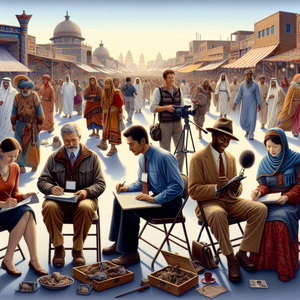
Exploring a Variety of Careers in History: Insights and Opportunities for Aspiring Historians
The world of history is rich with diverse career paths, each offering unique specializations and fulfilling roles. For those passionate about the past, a multitude of opportunities exists across various sectors, from academia to museums and beyond. This article aims to illuminate the different professions available to aspiring historians, emphasizing the essential skills of communication and research, as well as a strong grasp of historical methods.
Job Summaries:
Academic Historian:
- Academic historians immerse themselves in research and teaching at universities.
- Typically holding a Ph.D. in history, they specialize in specific areas and contribute to scholarly discourse through publications and lectures.
- Their mentorship shapes the next generation of historians.
Public Historian:
- Engaging with the public
- Public historians work in museums and community initiatives
- A master’s degree in public history is often required
- They curate exhibitions
- They design educational programs
- Making historical knowledge accessible to diverse audiences
Cultural Historian:
- Investigating societal practices and beliefs via cultural expressions like art and literature.
- Deepening understanding of identity and values.
- Graduate background in cultural studies or history is essential for this role.
Military Historian:
- Focusing on armed conflicts
- Military historians analyze records and personal accounts
- Understanding warfare's societal impacts
- A degree in military studies is typically essential
- Informs our comprehension of political and social dynamics
Economic Historian:
- Economic historians explore historical economic systems and their societal implications.
- A combination of a history degree and economic knowledge allows them to provide context for current economic issues.
Archival Manager:
- Archival managers ensure the preservation of historical documents.
- They require a master’s degree in archival or library science.
- They play a vital role in safeguarding history.
- They facilitate research access.
Museum Curator:
- Tasked with managing and exhibiting historical artifacts
- Museum curators develop exhibitions and engage the public
- A background in museum studies or history is critical for success in this role
- Project management skills are critical for success in this role
Historical Consultant:
- Historical consultants work with various organizations to ensure accurate historical representation.
- A degree in history and research experience are crucial for enhancing the authenticity of cultural projects.
Digital Historian:
- Digital historians utilize technology to present historical data through online platforms.
- A background in history combined with digital media skills expands accessibility to broader audiences.
Genealogist:
- Genealogists assist individuals in tracing their ancestry using historical records and genetic analysis.
- Training in genealogy or history, along with robust research skills, is essential for success.
Heritage Manager:
- Responsible for protecting and promoting historical sites
- Heritage managers usually have a background in history or archaeology
- They collaborate with stakeholders to develop conservation plans
- Conservation plans preserve cultural heritage.
Social Historian:
- Social historians examine everyday lives and cultural practices.
- Typically requiring a degree in history with a focus on social history.
- Their work sheds light on the lived experiences of various communities.
Art Historian:
- Analyzing art's evolution and cultural significance
- Art historians need a degree in art history
- Contextualize artworks within historical frameworks
Oral Historian:
- By collecting and analyzing personal narratives, oral historians ensure diverse perspectives are represented in historical records.
- Specialized training in oral history methods is typically required.
Environmental Historian:
- Environmental historians investigate the interplay between humans and the environment throughout history.
- A background in environmental studies or history aids their contribution to sustainability discussions.
Political Historian:
- Political historians explore the development of political systems and ideologies.
- Often requiring a degree in political science or history.
- Their insights are crucial for understanding political evolution.
Folklorist:
- Folklorists delve into traditional beliefs and customs.
- They emphasize oral traditions.
- A background in folklore studies or anthropology enhances their understanding of cultural identity.
Historical Fiction Writer:
- Merging fact with storytelling
- Historical fiction writers rely on thorough research to ensure authenticity
- A background in history or literature enriches their narratives.
Research Historian:
- Research historians focus on specific historical topics.
- Often contributing to publications.
- A master’s or doctoral degree in history is generally required.
- Strong research skills are generally required.
History Teacher:
- Educating future generations
- History teachers typically require a bachelor’s degree in history or education
- Teaching certification is necessary
- Making a lasting impact on students
The multitude of career paths available in history showcases the field's rich complexity. Each role plays a vital part in enhancing our understanding of the past, offering a range of opportunities for those passionate about history. Aspiring historians should actively seek job openings and consider educational requirements as essential steps toward a rewarding career. By grasping the responsibilities and impacts of each role, individuals can prepare themselves for a fulfilling journey in the historical profession. Engaging with professionals in the field and exploring real-world examples can further enrich this exploration, paving the way for future historians to thrive.
Explore More Jobs

